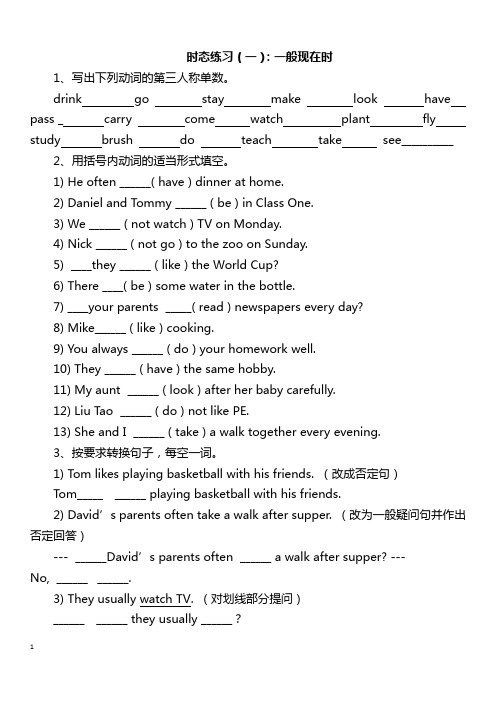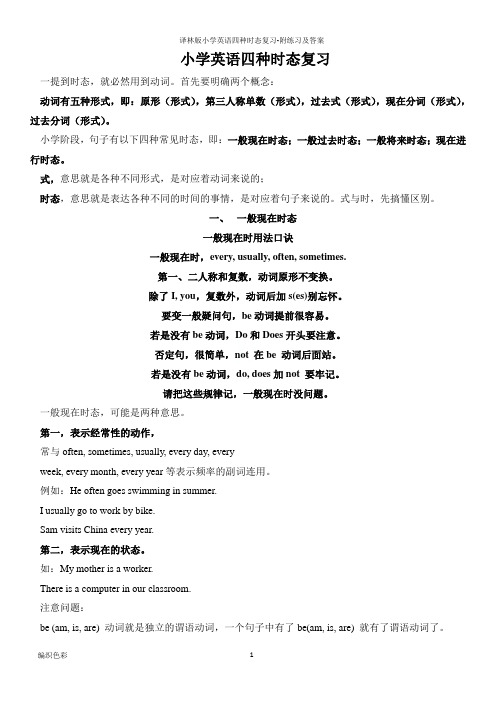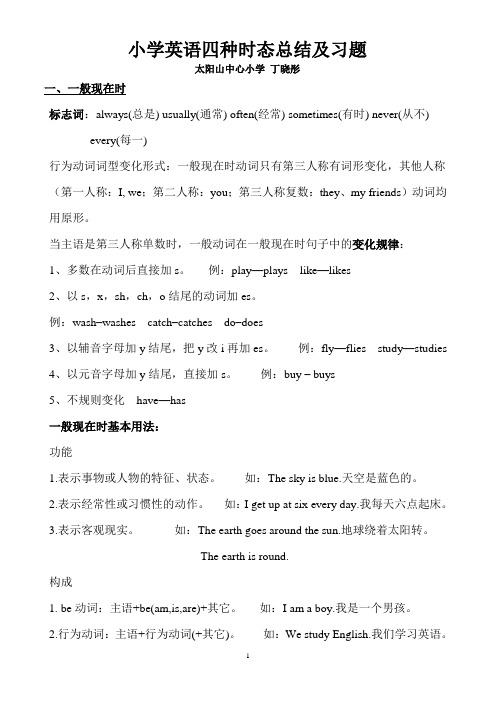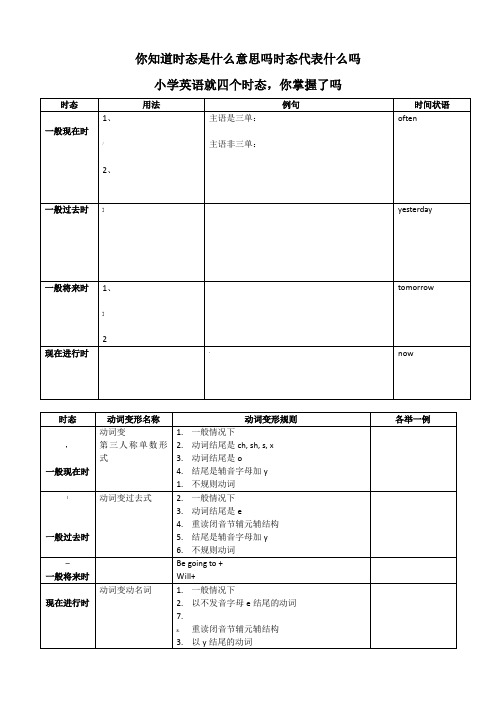小学英语四种时态重点及其练习
小学四大时态练习(打印版)

时态练习(一):一般现在时1、写出下列动词的第三人称单数。
drink go stay make look have pass _ carry come watch plant fly study brush do teach take see__________2、用括号内动词的适当形式填空。
1) He often ______( have ) dinner at home.2) Daniel and Tommy ______ ( be ) in Class One.3) We ______ ( not watch ) TV on Monday.4) Nick ______ ( not go ) to the zoo on Sunday.5) ____they ______ ( like ) the World Cup?6) There ____( be ) some water in the bottle.7) ____your parents _____( read ) newspapers every day?8) Mike______ ( like ) cooking.9) You always ______ ( do ) your homework well.10) They ______ ( have ) the same hobby.11) My aunt ______ ( look ) after her baby carefully.12) Liu Tao ______ ( do ) not like PE.13) She and I ______ ( take ) a walk together every evening.3、按要求转换句子,每空一词。
1) Tom likes playing basketball with his friends. (改成否定句)Tom_____ ______ playing basketball with his friends.2) David’s parents often take a walk after supper. (改为一般疑问句并作出否定回答)--- ______David’s parents often ______ a walk after supper? ---No, ______ ______.3) They usually watch TV. (对划线部分提问)______ ______ they usually ______?4)She is always a good student. (改为一般疑问句并作出肯定回答)5)--- ___ ______ always a ______ student? --- ______ , ______ ______ .6)5) Simon and Daniel like going skating. (改为否定句)7)Simon and Daniel ______ ______ going ______.6)Tom does his homework every day.(否定句)Tom_________ ______ his homework every day.7)Alice has got a new comic book as her birthday present.(改为一般疑问句并肯定回答)_________ Alice___________ a new comic book as her birthday presentYes, _______ _________.时态练习(二):一般将来时一、用所给动词的正确形式填空。
译林版小学英语四种时态复习-附练习及答案

小学英语四种时态复习一提到时态,就必然用到动词。
首先要明确两个概念:动词有五种形式,即:原形(形式),第三人称单数(形式),过去式(形式),现在分词(形式),过去分词(形式)。
小学阶段,句子有以下四种常见时态,即:一般现在时态;一般过去时态;一般将来时态;现在进行时态。
式,意思就是各种不同形式,是对应着动词来说的;时态,意思就是表达各种不同的时间的事情,是对应着句子来说的。
式与时,先搞懂区别。
一、一般现在时态一般现在时用法口诀一般现在时,every, usually, often, sometimes.第一、二人称和复数,动词原形不变换。
除了I, you,复数外,动词后加s(es)别忘怀。
要变一般疑问句,be动词提前很容易。
若是没有be动词,Do和Does开头要注意。
否定句,很简单,not 在be 动词后面站。
若是没有be动词,do, does加not 要牢记。
请把这些规律记,一般现在时没问题。
一般现在时态,可能是两种意思。
第一,表示经常性的动作,常与often, sometimes, usually, every day, everyweek, every month, every year等表示频率的副词连用。
例如:He often goes swimming in summer.I usually go to work by bike.Sam visits China every year.第二,表示现在的状态。
如:My mother is a worker.There is a computer in our classroom.注意问题:be (am, is, are) 动词就是独立的谓语动词,一个句子中有了be(am, is, are) 就有了谓语动词了。
句子中不能同时出现两个谓语动词。
不少同学经常出这样的错误:The boy is often eats hamburgers.(错)应当改为:The boy often eats hamburgers.二、现在进行时态正在进行时态口诀现在分词用途多,进行时态不用说。
(完整版)小学英语四种时态练习题丁晓彤

小学英语四种时态总结及习题太阳山中心小学丁晓彤一、一般现在时标志词:always(总是) usually(通常) often(经常) sometimes(有时) never(从不) every(每一)行为动词词型变化形式:一般现在时动词只有第三人称有词形变化,其他人称(第一人称:I, we;第二人称:you;第三人称复数:they、my friends)动词均用原形。
当主语是第三人称单数时,一般动词在一般现在时句子中的变化规律:1、多数在动词后直接加s。
例:play—plays like—likes2、以s,x,sh,ch,o结尾的动词加es。
例:wash–washes catch–catches do–does3、以辅音字母加y结尾,把y改i再加es。
例:fly—flies study—studies4、以元音字母加y结尾,直接加s。
例:buy – buys5、不规则变化have—has一般现在时基本用法:功能1.表示事物或人物的特征、状态。
如:The sky is blue.天空是蓝色的。
2.表示经常性或习惯性的动作。
如:I get up at six every day.我每天六点起床。
3.表示客观现实。
如:The earth goes around the sun.地球绕着太阳转。
The earth is round.构成1. be动词:主语+be(am,is,are)+其它。
如:I am a boy.我是一个男孩。
2.行为动词:主语+行为动词(+其它)。
如:We study English.我们学习英语。
句型肯定句:A. be动词:主语+ be + 其它成分如:He is a worker.B.行为动词:主语+动词(注意人称变化) +其它成分如:We like the little cat.否定句:A. be动词:主语+ be + not +其它成分如:They are not students.B.行为动词:主语+助动词(do/does) + not +动词原形+其它成分如:We don’t like the little cat.一般疑问句:A. be动词:Am / Is /Are +主语+ 其它成分如:Are you a teacher? Yes, I am. / No, I am not.Are they students of your school?Yes they are / No they aren’t.B.行为动词:助动词(Do/Does)+主语+动词原形+ 其它成分如:Do you like it? Yes, I do. / No. I don’t .Does he(she) like it? Yes, he( she )does. / No, he ( s he )doesn’t.特殊疑问句:疑问词+ 一般疑问句A. be动词:How many students are there in your school?B.行为动词:What do you usually do on Sunday?一般现在时动词be和have的变化形式1.动词Be 用法:第一人称单数用am,第三人称单数用is,其它人称用are。
小学英语四大时态总结及练习题

你知道时态是什么意思吗时态代表什么吗小学英语就四个时态,你掌握了吗你能发现它们之间的共同点和不同点吗勤加练习,百战不殆I.把下列动词变为第三人称单数形式。
1. clean--2. go--3. have--4.do-6. fly--7. come-- brush-9. watch-- 10. study-- 11. ask--(13. swim-- 14. catch-- 15. write--16. eat-- 17. make-- 18. paint—19. learn-- 20. phone-- 21. run—22. hop-- 23. sing-- 24. pick—II.把下列动词变成过去式is\am________ fly______ plant________are________ drink_________ play_______go________ make ______ does_________dance________ worry________ ask _____ taste_________ eat__________ draw________put ______ throw________kick_________ pass_______ do ________III.把下列动词变成动名词形式。
Wake________ make__________ come____________have____________!Take_________ leave__________ rid_________, regret__________, Begin________,cut________, get_________, hit_________, run_________, set_________, sit__________, spit__________, stop_________, swim________,beg_________, drop__________, fit_________, nod_________, dig___________, forget_________, travel_________visit_________Carry_________ enjoy___________ play ___________ study ________die_________ lie_________多加练习,百战不殆之时态篇一、用单词的正确形式填空:1.Mike _________ (do) his homework every day.2.There __________(be) some water in the glass.3.We like ________ (play) basketball after class.4.I like singing. I often _________(listen) to the music in the evening.5.【6.My grandma_________(watch) TV every day.二、判断句子的正误, 并改正。
小学英语四大时态总结(附小升初时态考题)

4. 以o结尾的单词: 有生命加s 。
tomato-tomatoespotato-potatoes无生命加espiano-pianosphoto-photoszoo-zoosradio-radios小升初时态专题综合训练1.(成都市青羊区小学毕业卷)John _____ football.A. likes playingB. likes playC. like play2.(深圳市龙岗区小学毕业卷)Does your mother _____ football?A. likeB. likesC. like play3.(芜湖市第三中学招生卷)They usually _____ TV in the evening.A. watchB. will watchC. are watchingD. watches4.(上海市奉贤区小学毕业卷)—What do you usually do on the weekend?—I often ____.A. do my homeworkB. did my homeworkC. doing my homework5. (杭州市西湖区小学毕业卷)I don’t like _____ thril lers(恐怖片)______ playing baseball.A. watching; orB. watching; andC. to watch; or6.(菏泽市晨曦中学招生卷)Bob often _____ to school.A. walkB. walksC. walked7.(南昌铁路一中初中部招生卷)My pen ______ on my desk ten minutes ago.But it _____ there now.A. is; isn’tB. was; isn’tC. is; is8.(长沙市宁乡县小学毕业卷)Mike is _____ after his classmates.A. runsB. runingC. running9.(桂林市奎光学校招生卷)Be quiet! The babies ________.A. sleepB. are sleepingC. slept10. (武汉市青山区小学毕业卷)______ he _____ his homework yesterday?A. Does; doB. Did; didC. Did; do11(北京市朝阳区小学毕业卷)—What did you do last weekend?—I ______.A. go swimmingB. did my homeworkC. went swim12.(芜湖市第十一中学招生卷)—What’s your hobby?—_____ is my hobby.A. Collecting stampsB. Collect stampsC. Stamps13.(广州市白云区小学毕业卷)—Where were you just now?—I _____ at school.A. isB. wasC. were14.(武汉市青山区小学毕业卷)______ he ______ his grandparents lastmonth?A. Did; visitedB. Did; visitC. Do; visited15.(郑州市二七区小学毕业卷)Last week, we _____ a _____ race.A. hard; runningB. have; runningC. had; running16.(福州市仓山区小学毕业卷)I______ to the park last week.A. goB. wentC. going17.(合肥市蜀山区小学毕业卷)If I _____ you tomorrow, I will give youthe receipt(收据)。
小学英语四种时态__谢

4.There
are (be)four seasons in(be) a tall girl. is 6.I
go (go)shopping once a week.
现在进行时(Present Progressive)
概念: 表示现在正在发生的动作h 或存在的状态 结构: be (is, am, are) + doing
小学英语动词的时态练习
(
)6. Did your father his friend on the 5th of October? A. called B. call C. is calling )7. Where A. was you last night? B. are C. were
4. 特殊疑问句
特殊疑问词+一般疑问句+? What is your father? 你爸爸是干什么的? What do you do every day? 你每天做些什么? When does your mother go to work every day? 你妈妈每天什么时候去上班?
小学英语四大时态总结及练习题

小学英语四大时态总结及练习题小学英语四大时态总结及练习题你知道时态是什么意思吗?时态代表什么吗?小学英语就四个时态,你掌握了吗?时态一般现在时1、2、1、2用法主语是三单:主语非三单:例句时间状语often一般过去时yesterday一般将来时tomorrow现在进行时now时态动词变形名称1.2.3.4.1.2.3.4.5.6.动词变形规则一般情况下动词结尾是ch,sh,s,x动词结尾是o结尾是辅音字母加y不规则动词一般情况下动词结尾是e重读闭音节辅元辅结构结尾是辅音字母加y不规则动词各举一例动词变第三人称单数形一般现在时式动词变过去式一般过去时一般将来时Begoingto+Will+1.2.7.3.4.一般情况下以不发音字母e结尾的动词重读闭音节辅元辅结构以y结尾的动词以ie结尾的动词动词变动名词现在进行时你能发现它们之间的共同点和不同点吗?勤加练习,百战不殆I.把下列动词变为第三人称单数形式。
1.clean--2.go--3.have--4.do-5.play--6.fly--e--brush-9.watch--10.study--11.ask--12.answer--13.swim--14.catch--15.write--16.eat--17.make--18.paint19.learn--20.phone--21.run22.hop--23.sing--24.pickII.把下列动词变成过去式is\\am________fly______plant________are________drink_________p lay_______go________make______does_________dance________worry_____ ___ask_____taste_________eat__________draw________put______throw________kick_________pass_______do________III.把下列动词变成动名词形式。
小学英语语法时态归纳及练习(含答案解析)

英语时态归纳一、一般现在时:标志词:often(经常) sometimes(有时) always(总是) usually(通常) never(从不) every(每一)行为动词词型变化形式:一般现在时动词只有第三人称有词形变化;其他人称(第一人称:I, we;第二人称:you;第三人称复数:they、my friends)动词均用原形。
当主语是第三人称单数时,一般动词在一般现在时句子中的变化规律:1、多数在动词后加s:play—plays like—likes ,2、以s,x,sh,ch,o结尾的动词加es wash–washes catch–catches do–does3、以辅音字母加y结尾,把y改i再加es fly—flies study—studies4、以元音字母加y结尾,直接加s buy – buys5、不规则变化have—has一般现在时基本用法功能1.表示事物或人物的特征、状态。
如:The sky is blue.天空是蓝色的。
2.表示经常性或习惯性的动作。
如:I get up at six every day.我每天六点起床。
3.表示客观现实。
如:The earth goes around the sun.地球绕着太阳转。
The earth is round.构成1. be动词:主语+be(am,is,are)+其它。
如:I am a boy.我是一个男孩。
2.行为动词:主语+行为动词(+其它)。
如:We study English.我们学习英语。
句型肯定句:A.be动词:主语+ be + 其它成分He is a worker.B.行为动词:主语+动词(注意人称变化) +其它成分We like the little cat.否定句:A.be动词:主语+ be + not+其它成分They are not students.B.行为动词:主语+助动词(do/does) + not+动词原形+其它成分We don’t like the little cat.一般疑问句:A.be动词:Am / Is /Are +主语+ 其它成分Are you a teacher? Yes, I am. / No, I am not.Are they students of your school. Yes, they are / No they aren’t.B.行为动词:助动词(Do/Does)+主语+动词原形+ 其它成分Do you like it? Yes, I do. / No. I don’t .Does he(she) like it? Yes, he( she )does. / No, he ( she )doesn’t.特殊疑问句:疑问词+ 一般疑问句A.be动词:How many students are there in your school?B.行为动词:What do you usually do on Sunday?一般现在时动词be和have的变化形式1.动词Be 叫连系动词, 用法:第一人称单数用am,第三人称单数用is,其它人称用are。
- 1、下载文档前请自行甄别文档内容的完整性,平台不提供额外的编辑、内容补充、找答案等附加服务。
- 2、"仅部分预览"的文档,不可在线预览部分如存在完整性等问题,可反馈申请退款(可完整预览的文档不适用该条件!)。
- 3、如文档侵犯您的权益,请联系客服反馈,我们会尽快为您处理(人工客服工作时间:9:00-18:30)。
四种时态的重点掌握内容一般现在时:主体构成:主语+be+名词/形容词主语+动词动词变化:一般词尾+S,sh/ch/s/x尾+es,辅音字母+Y尾把Y变i+es,辅音字母+o结+es.标志词:usually, often, sometimes ,always, never,every morning/night/evening/day/week,现在进行时:主体构成:主语+be+动词ing 标志性词语:look now listening形式变化:①直接+ing ②去掉e+ing③双写最后一个字母+ing get sit shop swim run一般将来时:主体构成:主语+be+going+动词原形标志性词语:tomorrow , tomorrow morning / afternoon, this morning/afternoon, next year /month, from now on (从现在开始),in an hour (一小时后),一般过去时:主体构成:主语+was/were+名词/形容词主语+动词过去式动词过去式形式变化:(1)一般在动词尾加ed。
(2)以不发音的e结尾的动词,直接加d。
(3)以“辅音字母+y“结尾的动词,变y为i再加ed。
(4)重读闭音节一个辅音字母结尾,双写词尾辅音字母再加ed。
发音规则: a. 以元音或浊辅音结尾的动词。
加— ed后,— ed发音浊辅音[d]。
b. 以清辅音结尾的动词,加— ed后,— ed发清辅音[t] 。
c. 以[t] [d]结尾动词加ed,ed发[id],与结尾的[t]、[d]相拼,读作[tid]或[did]. 标志性词语:last, just now, yesterday, …ago现在进行时一、用括号中动词的适当形式填空:1. My parents _______(watch)TV now.2. Look. Three boys _______(run).3. What _____ your mother _______(do)now?4. _______ your dog _______ now?(sleep)5. _____ you ______(listen)to music? Yes, I am.6. Look, Miss Chen _______ football.(play)7. Tom and his sister ____(wait)for you.8. Now Class 3 and Class 4______(have)a test.9. Listen, someone _____(sing)in the room. 10. She _____(talk)with May in the teacher’s office.二、选择填空:( )1. Who ______ over there now? A. singing B. are sing C. is singing( )2. It’s nine ten. The students _____ a music class. A. have B. having C. are having ( )3. Listen! The boy _______. A. crying B. is crying C. cries( )4. Do n’t talk here. Grandparents ______. A. sleep B. is sleeping C. are sleeping ( )5. Is the man _______ tea or milk? A. drinks B. drink C. drinking( )6. Look, they are _______in the river. (A) swimming (B) swim (C) swims( )7. _____friend's making ______ a kite. (A)I,me (B)My,my (C)My,me (D)His,his ( )8. Is the woman __ yellow your teacher?(A)in (B)putting on (C)wearing (D)having ( )9. Look! The twins_____ doing the housework.(A)are (B)is (C) am (D) do( )10. Look.Lucy _____a new bike today. (A) riding (B)is rideing (C) is riding ( )11. Is she ____ something? (A) eat (B) eating (C) eatting (D)eats( )12. The children____football. (A)is playing (B)are playing (C)play the (D)play a ( )13. They ____ TV in the evening. (A)are watching (B)can't watching (C)don't watch ( )14. They are _____ their clothes.(A)makeing (B)putting (C)put away (D)putting on ( ) 15. Listen! She ____ in the classroom. (A)is singing (B)sing (C)to sing (D)is sing三、按要求进行句型转换:1.Look! Lily is dancing.(改一般疑问句)_________________________________________2. Kate is looking for her watch.(改否定句)________________________________________3. Mrs. White is watching TV.(划线提问)_________________________________________4. I am doing homework.(改否定句)__________________________________________5. They are waiting for you at the library.(划线提问)_____________________________一般将来时一、选择题( ) 1.There ____ a meeting tomorrow. A. is going to be B. will go to be( )2.Charlie___here next month. A. won’t work B. working C. isn’t going to working( )3. He ___ busy this week A. will be B. is; C. will be; D. is( )4.There ____a football match tomorrow. A. was B. is going to have C. will have( )5. ____ you ___ free tomorrow? Are; going to B. Are; going to be C. Are; going to( )6. Mother ___ me a present on my next birthday. A. will gives B. will give C. gives ( )7. He _____ her a hat on her next birthday. A. gives B. will giving D. is going to give ( )8. He _____ to us as soon as he gets there. A. writes B. has written C. will write( )9. He _____ in three days. A. came back B. will come back C. is going to coming back ( )10.We ____the work this way next time. A. do B. will do C. going to do D. will doing ( )11.Tomorrow he ____a kite in the park. A. will flys; B. will flying C. is going to fly;( )12.tomorrow they ___a volleyball match. A. will watching B. watches C. is watching ( )13.They _____ a party tomorrow. A.are having B.are going to have C.will having ( )14. ___ you ____free next Sunday? A. Will; are B. Will; be C. Do; be D. Are; be ( )15. He ________ there at ten tomorrow morning. A. will B. is C. will be D. be二句型转换1. Nancy is going to go camping.(改否定)Nancy ________ going to go camping.2. I’ll go and join them.(改否定)I _______ go ______ join them.3. I’m going to get up at 6:30 tomorrow.(改一般疑问句)________ _______ ________ to get up at 6:30 tomorrow?4. We will meet at the bus stop at 10:30.(改一般疑问句)_______ ________ meet at the bus stop at 10:30.5. She is going to listen to music after school.(对划线部分提问)________ _______ she ________ ________ _________ after school?6. My father and mother are going to see a play the day after tomorrow.(同上)_________ _________ going to see a play the day after tomorrow.7. Today is a sunny day. We _______ (have) a picnic this afternoon.8. My brother _____(go) to Shanghai next week.9. Tom often _____ (go) to school on foot. But today is rain. He ______(go) to school by bike.10. What do you usually do at weekends? I usually____(watch) TV and ______(catch) insects?11. What ________(do) you do last Sunday? What _______(do) next Sunday?12. Mary _____ (visit) her grandparents tomorrow一般现在时一. 用所给动词的适当形式填空:1.Mike__________ (like) cooking. 2. She__________ (go) to school from Monday to Friday.3. He often_______ (have) dinner at home.4. Daniel and Tommy _______ (be) in Class One.5. There_____ (be) some water in the bottle.6. Don’t make a noise. Grandpa __________(sleep).7. It’s seven now, Tom’s family__________(watch) TV.8. It ________(take) me two hours to finish my homework last night.9. She often_______(wash) clothes in the evening.10. She______ (don’t do) homework every day. 11. The girl______ (teach) English on Sundays.12. There ________ (be) a football match on TV this evening.13. Your parents__________ (read) newspapers every day.14. What they often__________ (do) on Saturdays? 15. We ______ (not watch) TV on Monday.16. they__________ (like) the World Cup. 17. Nick________ (not go) to the zoo on Sunday.18. Liu Tao__________ (do) not like PE.19. Jenny and Danny usually______(play) games in the afternoon .二.单项选择:1. Jenny____ English every evening. A has study B studies C study D studied2. Wang Mei ____ music and often ____ to music. A like; listen B likes; listens C like; are listening D liking ; listen3. The picture _______ nice. A. looks B. is looked C. look D. is looking4. He ______ a good friend. A. having B. have C. to have D. has5. One of the boys_____ a black hat. A have B there is C there are D has三、按照要求改写句子1. Daniel watches TV every evening.(改否定句) ______________________________________2. I do my homework every day.(改一般疑问句) ________________________________3. She likes milk.(改为一般疑问句) ____________________________________________4. Amy likes playing computer games.(改一般疑问句)________________________________5. We go to school every morning.(改否定句)_____________________________________6. He speaks English very well.(改否定句)________________________________________7. I like taking photos in the park.(划线提问)_________________________________________8. John comes from Canada.(划线提问)_____________________________________________9. She is a good student.(改一般疑问句否定回答)____________________________________10. Simon and Daniel like going skating.(否定句)___________________________________一般过去时一、用动词的适当形式填空。
